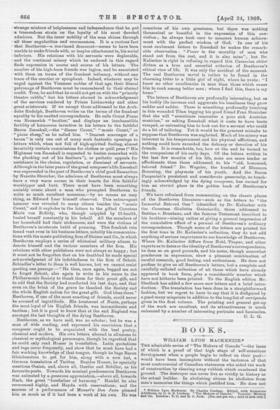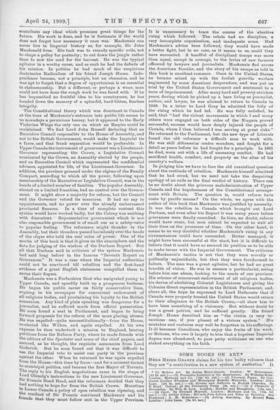BOOKS.
WILLIAM LYON MACKENZIE.*
TUE admirable series of "The Makers of Canada "—the issue of which is a proof of that high . stage of self-conscious development When a people begin to reflect on their past— would have been incomplete without the inclusion of that most controversial of Canadian statesmen who aided the work of construction by clearing away rubbish which cumbered the ground. The destroyer can never live so vividly in history as the actual builder. In abolishing abuses he abolishes from men's memories the things which justified him. Ho does not • Wam Lyon Mackenzie, By Charles Lindsey. Edited, with Numerous Additions, by U. U.S Lindsey. " The Makers of Canndn." Toronto: Morang and Co. London: T. C. and L. C. Jack. Ulla. net per vol.; sold in seta only.] contribute any ideal which promises great things for the future. His work is done, and he is fortunate if the World does not forget how necessary it once was. Mackenzie can never live in Imperial history as, for example, •Sir John Macdonald lives. His task was to remedy specific evils, not to shape a policy for posterity ; to cut down the jungle rather than to sow the seed for the harvest. He was the typical agitator in a worthy cause, and as such he bad the defects of hie mission. In politics he had much of the suspicious doctrinaire Radicalism of his friend Joseph Hume. Inde- pendence became, not a principle, but an obsession, and he was apt to forget that a degree of opportunism is an essential in statesmanship. But a. different, or perhaps a wiser, man could not have done the rough work he was faced with. If he has bequeathed no fruitful idea to his countrymen, he has handed down the memory of a splendid, bard-bitten, fearless integrity.
The Constitutional theory which was dominant in Canada at the time of Mackenzie's entrance into public life seems to us nowadays a pernicious heresy, but it appeared to the Early Victorian Whigs the only one on which an Empire could be maintained. We find Lord John Russell declaring that an Executive Council responsible to the House of Assembly, and not to the British Government, would make the Imperial tie a farce, and that frank separation would be preferable. In Upper Canada the instrument of government was a Lieutenant- Governor representing the Crown, a Legislative Council nominated by the Crown, an Assembly elected by the people, and an Executive Council which represented the confidential advisers, appointed for life, of the Lieutenant-Governor. In addition, the province groaned under the regime of the Family Compact, according to which all the power, following upon membership of the Executive or Legislative Council, was in the bands of a limited number of families. The popular Assembly, elected on a limited franchise, had no control over the Govern- ment. It might show a majority for reform, but the Council and the Governor vetoed its measures. It had no say in appointments, and no power over the already embarrassed provincial finances. In a time of complete content this system would have worked badly, but the Colony was seething with discontent. Representative government which is not also responsible government is of small use as a safety-valve to popular feeling. The reformers might thunder in the Assembly, but their thunders passed harmlessly over the heads of the clique who held the real reins of power. One of the merits of this book is that it gives us the atmosphere and the data for judging of the wisdom of the Durham Report. But all that Durham said in criticism of the system Mackenzie had said long before' in the famous "Seventh Report on Grievances." It was a case where the Imperial authorities could not be convinced till rebellion and the first-hand evidence of a great English statesman compelled them to revise their dogma.
Mackenzie was a Forfarshire Scot who emigrated young to Upper Canada, and speedily built up a prosperous business. Re began his public career on fairly conservative lines, arguing in his newspaper for concurrent endowment of all religious bodies, and proclaiming his loyalty to the British connexion. Any kind of plain speaking was dangerous for a journalist, and he suffered much from official persecution. Re soon found a seat in Parliament, and began to bring forward proposals for the reform of the more glaring abuses. Re was expelled—quite unconstitutionally—from the House, re-elected like Wilkes, and again expelled. At his own expense lie then undertook a mission to England, bearing petitions front the Reform Party, where he made friends with the editors of the Spectator and some of the chief papers, and secured, as he thought, the requisite assurances from Lord Goderich. But Ile soon found out that it was difficult to use the Imperial veto to assist one party in the province against the other. When he returned he was again expelled from the House—this time by force—and for a moment turned to municipal politics, and became the first Mayor of Toronto. The reply to his English negotiations came in the shape of Lord Glenelg's instructions to the new Lieutenant-Governor,
Sir Francis Bond Head, and the reformers decided that they Lad nothing to hope for from the British Crown. Meantime in Lower Canada a policy of open rebellion was ripening, and the conduct of Sir Francis convinced Mackenzie and his friends that they must follow suit in the Upper Province,
It is unnecessary to trace the course of the abortive rising which followed. The rebels had no discipline, a very incomplete organisation, and inadequate arms. Had Mackenzie's advice been followed, they would have made a better fight, but in no case, as it seems to us, could they have succeeded. A handful of disciplined troops was more than equal, except in courage, to the levies of raw farmers officered by lawyers and journalists. Mackenzie fled across the American frontier, and the story of his escape as told in this book is excellent romance. Once in the United States, he became mixed up with the foolish guerilla warfare engineered by some American desperadoes, and was put on trial by the United States Government and sentenced to a term of imprisonment. After many hard and poverty-stricken years, during which he picked up a bare living as journalist, author, and lawyer, he was allowed to return to Canada in 1849. In a letter to Lord Grey he admitted the folly of the rising which he had led. He was fully satisfied, he said, that "had the violent movements in which I and many others wore engaged on both sides of the Niagara proved successful, success would have deeply injured the people of Canada, whom I then believed I was serving at great risks." He returned to the Parliament, but the new typo of Liberals found the old reformer a difficult man to work with. He was still Athanaaitur contra munclurn, and fought for a detail as years before be had fought for a principle. In 1861 he died, worn out with a life of unceasing conflict. He had sacrificed health, comfort, and property en the altar of his country's welfare.
In judging him we have to face the old casuistical question about the rectitude of rebellion. Mackenzie himself admitted that he had erred, but we need not take the despairing apology of an exile as the final verdict of history. There can be no doubt about the grievous maladministration of Upper Canada and the hopelessness of the Constitutional arrange- meut with Britain. The question is, would reform have come by pacific means P On the whole, we agree with the author of this book that Mackenzie was justified by necessity. It was the rebellion in Canada which brought out Lord Durham, and even after his Report it was many years before grievances were finally remedied. In time, no doubt, reform would have come, but men cannot be expected to wait all their lives on the processes of time. On the other band, it seems to us very doubtful whether Mackenzie's rising in any circumstances could have succeeded. Better managed, it might have been successful at the start, but it is difficult to believe that it could have so secured its position as to be able to make terms with the Imperial Government. The criticism of Mackenzie's tactics is not that they were morally or politically unjustifiable, but that they were foredoomed to failure. The man was a great agitator, but he had no great breadth of vision. He was in essence a particularist, seeing before him one abuse, looking to the needs of one province. His scheme of concurrent endowment of all religious bodies, his device of abolishing Colonial Legislatures and giving the Colonies direct representation in the British Parliament, and, above all, the hope he expressed to Lord Dalhousie that if Canada Were properly treated the United States would return to their allegiance to the British Crown,—all show him to have been something of a visionary. But without doubt he was a great patriot, and be suffered greatly. His friend Joseph Hume described him as "the victim (it very in- cautious ono, if you please) of a vicious system." His mistakes and rashness may well be forgotten in his sufferings. It ill becomes Canadians, who enjoy the fruits of his work, or Britons, who owe it largely to him that a hopeless Imperial dogma was abandoned, to pass petty criticisms on one who staked everything on his faith.























































 Previous page
Previous page